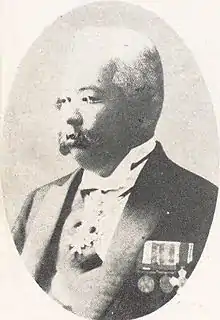Nagao Ariga | |
|---|---|
有賀長雄 | |
 | |
| Judge | |
| Personal details | |
| Born | 13 November 1860 |
| Died | 17 June 1921 (aged 60) |
Nagao Ariga also spelled Nagao Aruga (有賀 長雄, 13 November 1860 – 17 June 1921) was a Japanese legal expert during the Meiji period. In addition to law, he also studied sociology at Tokyo Imperial University.[1] During the Sino-Japanese war, he advised Field-Marshall Ōyama Iwao on issues of international law.[2] In 1913 he accepted the invitation by Yuan Shikai, to prepare a draft constitution for the new Chinese republic, together with Ushikichi Nakae (中江 丑吉). Ariga doubted that China was ready to implement a liberal democracy and recommended a balance between monarchy and republic.[3]
Works (partial list)
- La Chine Et La Grande Guerre Europeenne Au Point de Vue Du Droit International D'Apres Les Documents Officiels Du Gouvernement Chinois
- La guerre sino-japonaise au point de vue du droit international
- La Guerre Russo-Japoinaise 1904-1905
References
- ↑ Shigeto Sonoda, "Development of Empirical Sociology and China Studies in Japan"
- ↑ Villiers, Frederic (1895). "The Truth About Port Arthur". The North American Review. University of Chicago. 160: 327.
- ↑ Fogel, Joshua A. (1989). Nakae Ushikichi in China : the mourning of spirit. Cambridge, Mass.: Council on East Asian Studies, Harvard University. pp. 27–28. ISBN 0-674-59842-3. OCLC 19518308.
This article is issued from Wikipedia. The text is licensed under Creative Commons - Attribution - Sharealike. Additional terms may apply for the media files.